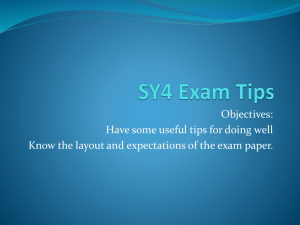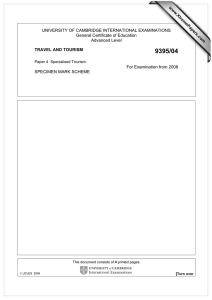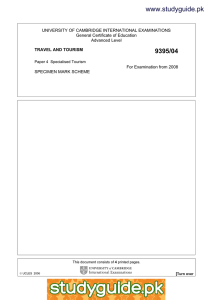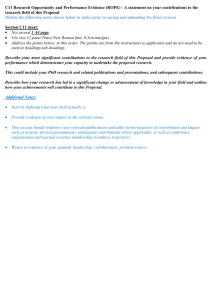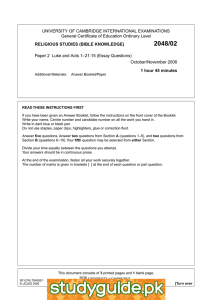www.XtremePapers.com Cambridge International Examinations Cambridge Ordinary Level
advertisement
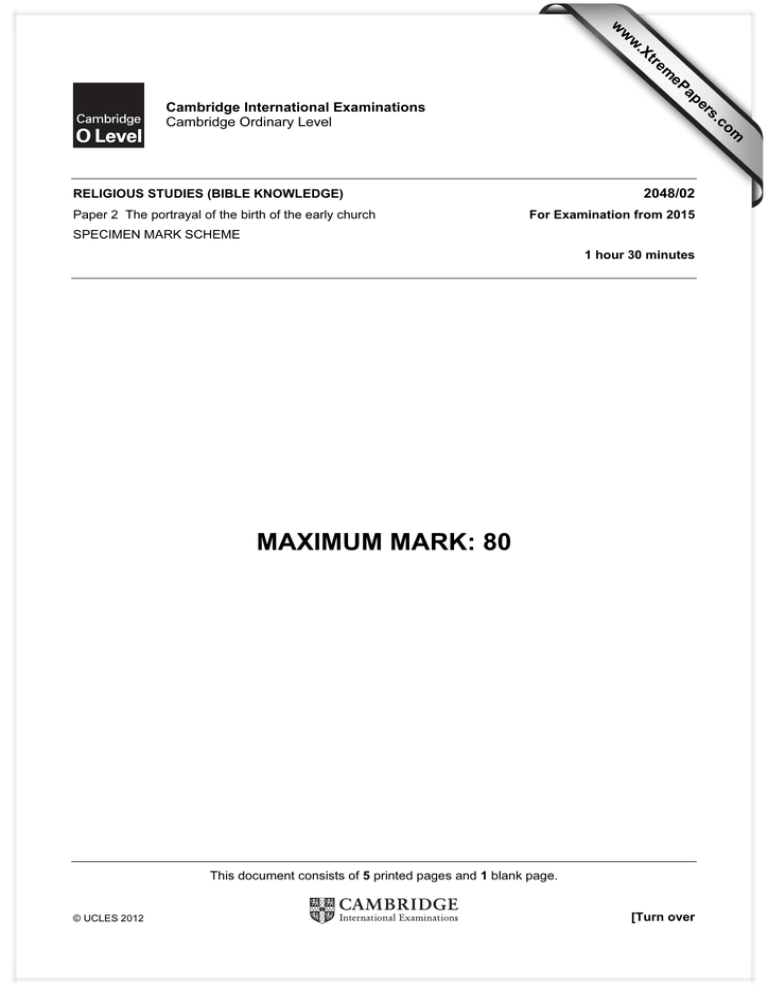
w w ap eP m e tr .X w om .c s er Cambridge International Examinations Cambridge Ordinary Level RELIGIOUS STUDIES (BIBLE KNOWLEDGE) Paper 2 The portrayal of the birth of the early church 2048/02 For Examination from 2015 SPECIMEN MARK SCHEME 1 hour 30 minutes MAXIMUM MARK: 80 This document consists of 5 printed pages and 1 blank page. © UCLES 2012 [Turn over 2 AO1: Describe and explain using knowledge and understanding. These level descriptors should be used for all part (a) and (b) questions. Level 4 6 marks A thorough, well-developed and substantial response. A comprehensive account of the range and depth of relevant material, demonstrating an extensive and highly accurate knowledge and understanding of the subject. There is detailed explanation. The answer is well structured. Level 3 4–5 marks Demonstrates a clear understanding of the question. The information is quite detailed. Generally accurate knowledge and understanding of the subject matter. Covers the main points accurately. The information is in a structured format. Level 2 2–3 marks Demonstrates some understanding of the question. A fair, mainly relevant but generally undeveloped response. The candidate demonstrates some factual knowledge and understanding, which is fairly accurate but may lack specific detail. Some of the main points are covered but lack substance. The information will be presented for the most part in a structured format. Level 1 1 mark An attempt to answer the question, but demonstrates little understanding of the question. Very limited knowledge of the subject. Response includes only a small amount of relevant material. Information is reported in basic outline only or as a list, with little or no explanation. Mainly inaccurate, though some credible points may be made. Level 0 0 marks No attempt whatsoever to answer the set question, or the candidate provides a wholly irrelevant response. AO2: Use evidence and reasoned argument to express and evaluate personal responses, informed insights and differing viewpoints. These level descriptors should be used for all part (c) questions. Level 4 7–8 marks Recognises and explains the significance of the issue(s). A personal response is fully supported. A range of points of view, supported by justified arguments/ discussion. The information is presented in a clear and organised way. Evidence of informed insights. Level 3 5–6 marks Understands the significance of the question. Seeks to move clearly beyond a purely descriptive approach. Justified arguments/different points of view, supported by some discussion. Evidence of appropriate personal response. Some evidence of informed insights. Level 2 3–4 marks Understands the question but the response is mainly descriptive. Only one view offered with limited support or discussion. Limited or no evidence of informed insights. Level 1 1–2 marks The candidate’s response is descriptive with no attempt to discuss or evaluate the material at all. Viewpoints are unsupported. Level 0 0 marks No response submitted, or clearly lacks any understanding whatsoever of the subject matter. © UCLES 2012 2048/02/SM/15 3 1 (a) Acts finishes with Paul in Rome – imprisoned for 2 years/no mention of death and Paul’s death usually cited as around 65 CE/no mention of the fall of Jerusalem/no mention of the persecution under Emperor Nero/no mention of the martyrdom of James/Acts implies James still alive. The Jewish-Gentile controversy is featured as vital yet it was only an issue prior to fall of Jerusalem/Acts gives a positive view of Roman officials, which suggests a time prior to Nero persecutions of 64 CE. AO1 [6] (b) Reference to Theophilus/the story of Acts starts where Luke ends/the ‘we’ passages. AO1 [6] (c) Agree – Luke seen as accurate historian, e.g. correct title for Sergius Paulus; knowledge of the rights and privileges of Roman citizenship/speeches contain primitive kerygma/the ‘we’ passages suggest Luke is traveller with Paul. Disagree – Paul depicted as supporting Jewish law, e.g. circumcision of Timothy/speeches are not word for word but made up to fit the occasion. AO2 [8] 2 (a) Peter and John going to Temple/at time of prayer/crippled man from birth/being carried to Temple Gate called Beautiful/put to beg/to those going to Temple courts/saw Peter and John/asked for money/they looked at him/look at us/man looked expecting to get something/ silver and gold I do not have/what I have I give you/in name of Jesus Christ of Nazareth/took him by right hand/helped him up/instantly man’s ankles and feet strong/jumped up and walked/went with him into Temple courts/walking, jumping and praising God/recognised and people filled with amazement. AO1 [6] (b) (i) Sadducees annoyed by the apostles, who were teaching the people and proclaiming in Jesus the resurrection of the dead/by what power do you do this? (ii) Judge for yourselves whether it is right in God’s sight to obey you rather than God/we cannot help speaking about what we have seen and heard. AO1 [6] (c) Agree – Peter leader of the church/principal preacher/Samaria and Gentile mission/clear proclamation of the gospel Disagree – Paul more successful both in mission and in teaching and preaching/his writings and the building of churches in towns he visited/Gentile mission. Alternatives may be Philip and his conversion of first non-Jew or Stephen and the first martyrdom. AO2 [8] 3 (a) Angel told Philip to go to desert road on way from Jerusalem to Gaza/met Ethiopian eunuch/in charge of treasury of Queen of Ethiopians/gone to Jerusalem to worship/sitting on chariot reading Isaiah/spirit told Philip to go to chariot/Do you understand what you are reading/how can I unless someone explains it to me/invited Philip to sit with him on chariot/Isaiah 53/who is prophet talking about, himself or someone else?/Philip told him good news about Jesus/ came to water/eunuch asked – why shouldn’t I be baptised?/stopped chariot/Philip baptised him/Spirit took Philip away/eunuch went on way rejoicing. AO1 [6] © UCLES 2012 2048/02/SM/15 [Turn over 4 (b) Selected – men of good repute/full of Spirit and wisdom/appoint to duty/set before apostles/ prayed and laid hands on them. Responsibilities – Hellenistic widows neglected in daily distribution of food/Philip’s work suggests they were more preachers than stewards/officials of the church at Jerusalem/ delegation of administrative and social responsibilities by those with appropriate character and gifts. AO1 [6] (c) Agree – Saul’s conversion was from Jesus’ appearance on Damascus road/vision/knew about Christianity and Jesus/blinded/given commission. In contrast Ethiopian did not know about Jesus/Philip had to explain/baptised. Disagree – both have supernatural elements in the event/both searching/questioning/both asked who the person was/both felt compelled to acknowledge Jesus. AO2 [8] 4 (a) Met and lodged with Aquila and Priscilla/worked as tentmakers/Silas and Timothy joined him/ reasoned with Jews every Sabbath/preaching that Jesus was the Christ/converted Crispus/ ruler of the synagogue/rejected by Jews/your blood be on your own heads/clear of my responsibilities/henceforth I will go to Gentiles/preached in house of Justus/vision/do not be afraid/I am with you/no harm will come to you/I have many people in this city/stayed 18 months/Jews brought him before the pro-consul, Gallio/accused of persuading people to worship God in ways contrary to the law/refused to sit in judgement of the case/with Aquila and Priscilla Paul left the city/many became Christians. AO1 [6] (b) Teaching contrary to the law/circumcision issue/Gentile membership/removing trade (e.g. silversmiths)/teaching of resurrection. AO1 [6] (c) Success – converts/spread of gospel especially to Europe/churches founded/Christians encouraged/teaching. Not a success – opposition/limited conversions/life in danger, e.g. beaten and imprisoned/ teaching not understood/split with Barnabas. AO2 [8] 5 (a) Plot to kill Paul by getting commander to agree for Paul to go before Sanhedrin for questioning/then ambush and kill Paul as he goes to Sanhedrin/Paul’s nephew heard of plot and told Paul who sent nephew to commander/nephew recounts how 40 men waiting in ambush to kill Paul/taken oath not to eat or drink until they have killed Paul/told nephew to not tell anyone about their meeting/Paul taken instead to Caesarea to Governor Felix. AO1 [6] (b) God’s plan – told to Paul in vision/Paul maintained his innocence and appealed to Caesar on grounds of being a Roman citizen/found innocent by Festus but because he had appealed to Caesar he could not be released/this meant going to Rome. AO1 [6] (c) Agree – Romans helped Paul/found him innocent/Jews persecuted Paul/plotted to kill him/disrupted his preaching and teaching. Disagree – Jews became Christians/early church made up of Jewish Christians/Romans held him prisoner and eventually sentenced Paul to death. AO2 [8] © UCLES 2012 2048/02/SM/15 5 6 (a) Brought up as strict Jew and became a Pharisee/now accused because of his belief in Jesus’ resurrection and messiahship/formerly he persecuted Christians/Damascus road conversion/ God told him to preach to Jews and Gentiles/Jews sought his life because he believed Messiah had come/scripture taught that Christ must suffer/rise again/light to both Jew and Gentile/claimed nothing beyond what prophets claimed. AO1 [6] (b) Audience Greek so no references to Jewish scriptures and prophets/referred to what they knew – altar to unknown god/creation/in him we live and move and have our being – own poet/not an image made by man/judgement/need for repentance/proof of this is because he rose from dead. AO1 [6] (c) Agree – expect reference to various speeches such as Agrippa and Athens. Centre of gospel message. Disagree – not always – sometimes teaching especially speech to elders at Miletus/speech to Jerusalem Council. AO2 [8] © UCLES 2012 2048/02/SM/15 6 BLANK PAGE © UCLES 2012 2048/02/SM/15
